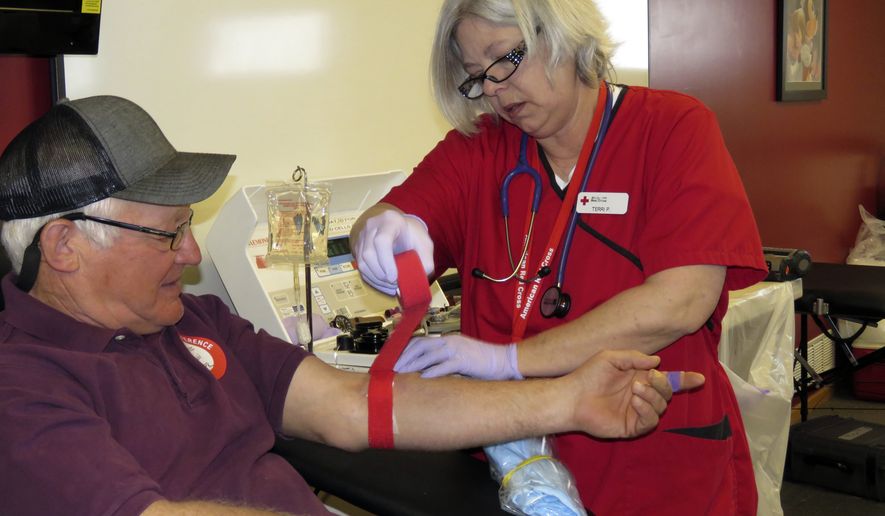Amy Scarbrough of Falls Church has been a blood donor for years, so she was glad it was deemed an essential reason to leave the house during the COVID-19 pandemic.
“In fact, to get this appointment, I think it was two and a half, three weeks ago when I made it,” Ms. Scarbrough said, “because they need to reset and can’t have the drives that they normally do.”
A month after blood drives were canceled in droves and blood banks experienced shortages, individual donations have boomed as people look for ways they can help others during the pandemic.
More than 4,000 blood drives were canceled in March due to the pandemic forcing people to stay at home. The American Red Cross said it lost more than 86,000 expected blood donations that month.
Terri Craddock, director of blood donor services for Inova Health System in Virginia, said Inova saw around 50 drives canceled last month. Organizers of the canceled drives include high schools, churches and the Washington Capitals’ quarterly blood drive at their practice facility in Arlington.
“With all the conversations about people staying home, we didn’t really know what was going to happen,” Ms. Craddock said.
But after Surgeon General Jerome M. Adams and Virginia Gov. Ralph Northam each encouraged the public to give blood, Ms. Craddock said, “people just started pouring in to donate.” In mid-March, Inova’s inventory was at about 60% of where it should have been, but now it’s near 100%, she said.
Blood usage decreased a certain amount during March, too, because people put off elective surgeries. But donations nonetheless are always in demand. A message on Inova Blood Donor Services’ website tells visitors that someone in the U.S. needs blood every two seconds.
“The cancer patients are still getting transfused. Traumas are still coming into the emergency room,” Ms. Craddock said. “So the need for blood never goes away.”
Inova operates four blood donor centers in Northern Virginia, three of which are currently open. Blood drives may be coming back soon, too; the Washington National Cathedral is hosting a drive April 15-18 with safety measures designed by the Red Cross.
The federal government has endeavored to make donating easier for certain groups, too. The Food and Drug Administration this month rolled back its restriction on blood donations from men who have had sex with men in the past 12 months, lowering the threshold to just three months’ grace before being allowed to donate.
Donors must be in healthy condition, and people who have traveled to countries at risk of malaria are still required to wait for a period before giving. Besides that, Duke University professor of medicine and business Peter Ubel said “there’s no particular group of people that should or shouldn’t” donate.
“Obviously this is a huge challenge, to even have people come to where they would donate blood, where they’re expected to be sheltering or staying at home,” Dr. Ubel said. “Or those places where the blood collection happens have to figure out new protocols to sterilize even more carefully, to keep people apart from each other while they’re in line waiting to donate.”
For Inova, those new protocols include taking staff members’ temperatures twice during their shifts and ensuring they wear masks and personal protective equipment. The group also extended operating hours at its collection centers in Annandale, Centreville and Sterling to 9 a.m. to 7 p.m. weekdays, 8 a.m. to 4 p.m. Saturdays and 10 a.m. to 4 p.m. Sundays to spread out visits from donors for better social distancing.
Inova’s other site, at Mount Vernon Hospital in Alexandria, is temporarily closed because the hospital is limiting who can enter during the pandemic.
Even with blood supplies rising again, healthy people are still encouraged to donate due to the unpredictable circumstances of the pandemic. Ms. Craddock, who has worked in blood donor services for 35 years, saw challenging periods of time due to other diseases and world events.
“We’ve come across a lot of things, whether it’s been 9/11 or SARS or H1N1,” she said, “but never anything like this.”
• Adam Zielonka can be reached at azielonka@washingtontimes.com.




Please read our comment policy before commenting.